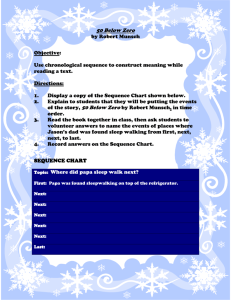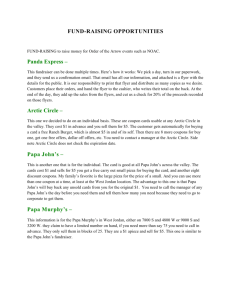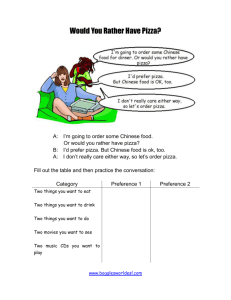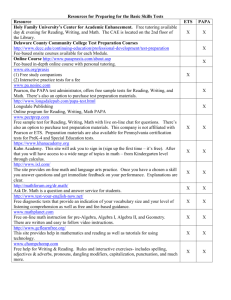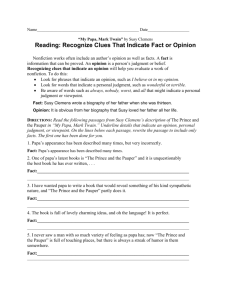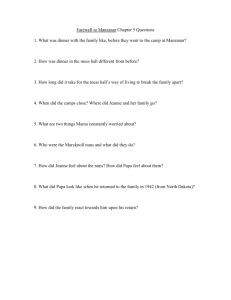Papa John's Pizza Marketing Plan - Scott A. Treloar
advertisement
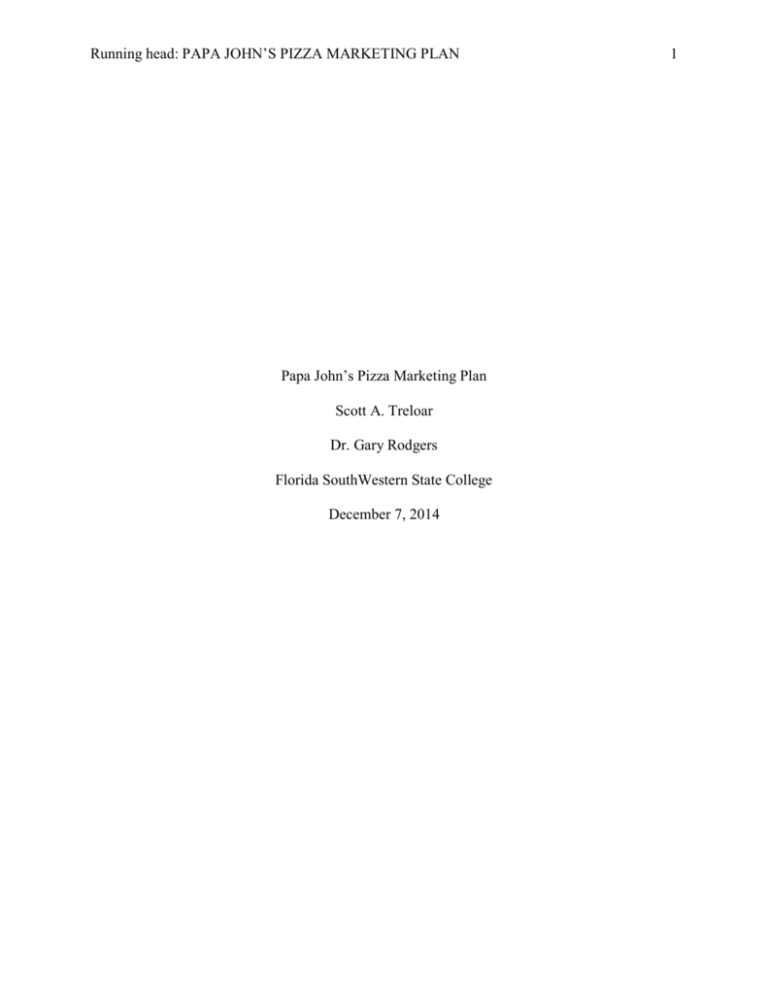
Running head: PAPA JOHN’S PIZZA MARKETING PLAN Papa John’s Pizza Marketing Plan Scott A. Treloar Dr. Gary Rodgers Florida SouthWestern State College December 7, 2014 1 PAPA JOHN’S PIZZA MARKETING PLAN 2 Table of Contents 1. Executive Summary 3 2. Situation Analysis 4 3. Market Analysis and Strategies 13 4. Tactical Plans 16 5. Branding Strategy 22 6. Conclusion 25 7. References 26 PAPA JOHN’S PIZZA MARKETING PLAN 3 Executive Summary This marketing plan will examine the situational analysis (5Cs), market analysis and strategies (STP), tactical plans (4Ps), and branding strategy of Papa John’s Pizza. Papa John’s has increased its marketing efforts as it has moved from local to national to international strategies. Papa John’s is growing exponentially internationally as it expands into the emerging economy of China. Domestically, the company has seen explosive growth in its marketing capital with the endorsement and partnership with the most popular player in the National Football League, Peyton Manning. Prospects continue to look good as Papa John’s Pizza is proving that a company can grow without sacrificing quality or service in an economy that has been sluggish at best since the recession of 2008. While people have less disposable income and are fighting to stay above water, Papa John’s Pizza continues to grow and all while charging premium prices for its products and while retaining customer loyalty. This marketing plan will consider Papa John’s marketing strategy, the environment domestic and international, an analysis of its strengths and weaknesses and conclude with future expectations and recommendations to pursue future expansion. PAPA JOHN’S PIZZA MARKETING PLAN 4 Situational Analysis (5Cs) The Company In this section this student will examine the identity of Papa John’s Pizza by establishing who they are, what they are known for, and what they want to become. This section will also analyze its strengths, weaknesses, opportunities, and threats. Who is Papa John’s Pizza? Papa John’s Pizza was started in 1984 by John Schnatter, and is built on the concept that a high quality pizza could be delivered with the expectation of great customer service. Mr. Schnatter saw that both were missing from national pizza companies and built Papa John’s into the third largest pizza chain in the world (Papa John's Pizza, 2014). They are headquartered in Louisville, KY with about 4,165 Papa John’s restaurants or franchises in about thirty-five countries around the globe (Hoover's, 2014). For what is Papa John’s Pizza Known? Papa John’s is known for making high quality pizzas, which consists of fresh made, never frozen dough made from a proprietary mix of wheat flour, 100% real mozzarella cheese, fresh pizza sauce made from vine-ripened tomatoes mixed with the company’s own blend of spices. Toppings include and a choice of high-quality meats (beef and pork that contains no fillers) and fresh vegetable toppings that are never frozen (Papa John's Pizza, 2014). They are also known for excellent customer service, the number one rated pizza chain in customer satisfaction eleven of the past thirteen years according to the American Customer Satisfaction Index (Papa John's Pizza, 2014). PAPA JOHN’S PIZZA MARKETING PLAN 5 What Does Papa John’s Pizza Want to Become? According to the company’s 2014 annual 10K report, the goal of Papa John’s Pizza is, “to build the strongest brand loyalty in the industry (Papa John's Pizza, 2014).” Key elements to achieving their goals include maintaining the high quality menu offerings for which they are known, the development of new menu items to complement the current menu, an efficient operating system that promotes low costs, high quality food products, and superior customer service, a commitment to its employees through training and development programs, an international, national and local marketing strategy, and the development and maintenance of a strong franchise system (Papa John's Pizza, 2014). SWOT Analysis STRENGTHS WEAKNESSES High quality ingredients Fewer locations Great customer service Limited menu Strong employee training program Strong marketing Switching Costs Efficient restaurant design Efficient supply chain OPPORTUNITIES THREATS New markets Competitors Menu New menu items Competitors Locations Investigation of company claims PAPA JOHN’S PIZZA MARKETING PLAN 6 Strengths Papa John’s strengths include its high quality ingredients, great customer service, a strong employee training program, strong marketing, efficient restaurant design, and an efficient supply chain. First, as previously stated, Papa John’s makes its pizzas with fresh, never frozen ingredients, that don’t contain additives or fillers, and are not from concentrate (Papa John's Pizza, 2014). This gives them a competitive advantage in the area of taste and arguably, their pizzas are healthier than the competition. Second, Papa John’s offers its customers great customer service, having earned its reputation, according to the American Customer Satisfaction Index, as the number one rated pizza chain in customer satisfaction eleven of the past thirteen years (Papa John's Pizza, 2014). Third, Papa John’s has a strong employee and franchisee training and development program to ensure consistency throughout its stores. This insures employees have advancement opportunities, incentives and recognition (Papa John's Pizza, 2014). Fourth, Papa John’s Pizza has a strong marketing program that is increasing its revenues and market share. Papa John’s advertises internationally, locally, and nationally. Internationally, they employ a combination of strategies, which includes television, radio, digital, and print advertising. Local advertising strategy includes the use of television, radio, and print opportunities. The national strategy includes advertising via television, print, direct mail, digital, mobile marketing and social media channels. Papa John’s online and digital marketing via Internet and mobile phone and tablet applications has increased as consumers have become more tech savvy and mobile (Papa John's Pizza, 2014). Papa John’s is the Official Pizza of the National Football League and the Official Pizza of the Super Bowl. In 2013, Papa John’s was the NFL’s most recognized sponsor, which PAPA JOHN’S PIZZA MARKETING PLAN 7 included greater recognition than Budweiser, Visa, and Verizon Wireless (Papa John's Pizza, 2013, p. 5). This has included a television ad campaign with Peyton Manning, the Denver Broncos starting quarterback and a new owner of 21 Papa John’s restaurants (Associated Press, 2012). Mr. Manning is the recognized face of the National Football League by over 62% of its fans (Papa John's Pizza, 2013, p. 5). This alliance with Peyton and the NFL cannot be overstated. Due to the quarterback’s endorsement, Papa John’s has increased its marketing capital from $900 million in 2010 to over $2.2 billion in 2014. This occurred while Pizza Hut secured the services of another popular Super Bowl winning quarterback, Aaron Rodgers of the Green Bay Packers. Pizza Hut outspent Papa John’s three-to-one in their 2013 campaign (Kelso, 2014). According to a recent Harris poll, the Denver Broncos unseated the Dallas Cowboys as “America’s Team” (Legwold, 2014), largely because of its popular team leader. Company revenues are higher because of Peyton’s popularity and clean image as well as his role as a franchise owner. His endorsement has most certainly impacted the company’s sales. Fifth, is Papa John’s store design which allows the employees to work efficiently. Because of its open floor plan, employees can see customers from anywhere in the store so that they can respond quicker and provide better service. Customers can also see the employees making their fresh pizza right before their eyes (Carlisle, 2006, p. 19). Finally, Papa John’s has an efficient supply chain that gives them an advantage by insuring consistency in the quality and delivery of its fresh ingredients to its stores. They are able to keep costs low because of economies of scale that gives them volume bargaining power (Papa John's Pizza, 2014). PAPA JOHN’S PIZZA MARKETING PLAN 8 Weaknesses Unlike its primary competitors, Domino’s Pizza and Pizza Hut, Papa John’s has fewer locations so it has smaller coverage and less market penetration (Carlisle, 2006, p. 19). If there is an upside to this weakness, it is that there is more growth potential than for the competition. Papa John’s also has a limited menu that only offers pizzas, soft drinks, breadsticks, and chicken wings (Papa John's Pizza, 2014). Pizza Hut offers pizza, pasta, wings, salads, waffle fries, multiple varieties of breadsticks, drinks, and desserts (Pizza Hut, 2014). Domino’s Pizza has pizzas (including gluten-free), pasta, sandwiches, chicken tenders, breadsticks, chips, desserts, and drinks (Domino's Pizza, 2014). Finally, switching costs for customers are low. This can hurt Papa John’s because pizza is a commodity. While some customers may be loyal, the majority are likely to choose to order based upon other factors like convenience and/or coupons. Just like soft drink choices, customers may often go with the sale of the week when deciding which way to go (Carlisle, 2006, p. 20). Opportunities Papa John’s weaknesses can also be opportunities in the areas of locations and menus. Because Papa John’s has fewer locations, expansion of their stores will result in greater market penetration and access to more potential customers. They also have opportunities to expand their menu. They already have a reputation for being fresh so they could offer more health-conscious choices like salads and kid-friendly healthy drinks like milk. The difficulty in offering menu items with fresh ingredients is the ability to match similar items on competitor’s menus like potato chips and desserts. Fresh sandwiches and chicken tenders are possible, though. PAPA JOHN’S PIZZA MARKETING PLAN 9 Threats The competition, its menus and locations are the largest threats to Papa John’s. As stated earlier, fewer locations and a smaller menu limit market share and choices to customers. There was also a recent threat to Papa John’s market share due to a current controversy regarding its claim to use only fresh ingredients. An investigation into the company’s claim of better ingredients and better pizza by a journalist yielded the company’s lack of transparency in disclosing nutritional information for the products on their menu (Warner, 2013). Papa John’s was accused of false advertising by Pizza Hut in 1998 but the law suit was thrown out by a Federal Court of Appeals judge on a technicality. Papa John’s did not have to pay damages of over $467,000 from the original suit but it didn’t mean that they weren’t lying about their claims of fresher and better ingredients (Associated Press, 2001). The Customers In this section, this student will examine the Papa John’s customer demographic. Customers are the buyers, who have needs in the market, who Papa John’s is seeking to satisfy. Papa John’s target market is middle income heads of households, people with a higher than average income, though they may not be affluent. They tend to be older than college-age kids and teenagers with disposable income and are often brand-conscious, loyal customers. They are also a more stable market during tough economic times. On the other hand, the other pizza companies compete with price strategies (Viveiros, 2014). PAPA JOHN’S PIZZA MARKETING PLAN 10 The Context In this section, this student will consider the context, which is the current state of the economy, the legal and regulatory environment, and cultural factors, which exist in the market that Papa John’s may be facing. Since 2008, things have been sluggish and people have had less disposable income, struggling in the midst of a depressed economy. The economy is not anywhere close to full employment but the United States saw over 300,000 jobs added recently while it also saw an increase in wage levels. Economists predict that the damage done during the recession will hurt potential growth once the economy reaches full employment (Krugman, 2014). Globally, economic is expected to continue growing as income levels in emerging economies continues to grow. The legal and regulatory is status quo but there are global concerns about political instability in areas like Ukraine and the Middle East (McKinsey & Company, 2014). Culturally, what Papa John’s faced in the past is still the same. The Collaborators In this section, this student will examine Papa John’s partners in their supply chain and partners in advertising and marketing efforts. These partners include food producers and suppliers, and media partners. Food Producers and Suppliers Papa John’s has ten regional full-service QC Centers (Quality Control Centers), that are responsible for the distribution of pizza dough, food products, paper products, and other store PAPA JOHN’S PIZZA MARKETING PLAN 11 supplies. This allows Papa John’s to control the quality and consistency of their food, while lowering costs. There are also QC Centers in the United Kingdom, Mexico City, and Beijing. There are other international licensed QC Centers in the markets where franchises exist. All Papa John’s stores must purchase its tomato sauce and dough from the QC Centers while other goods may be purchased from QC Centers or other approved vendors. National purchasing agreements with key vendors gives Papa John’s volume discounts which allows the sale of products at prices below those in the general marketplace. Distribution is generally accomplished by refrigerated trucks leased and operated by the company (Papa John's Pizza, 2014). Media Partners Papa John’s advertises in a number of ways including print, radio, television, direct mail, and Internet, mobile devices, digital devices, and text and email to fulfill its marketing needs (Papa John's Pizza, 2014). They also partner with the National Football League to collaborate advertising efforts, with Peyton Manning being its chief endorser and spokesperson. They are the Official Pizza of the NFL and the Super Bowl (Papa John's Pizza, 2013, p. 5). The Competition Finally, this student will examine the chief competitors vying for the same market share that Papa John’s Pizza seeks. This includes direct and indirect competition. Papa John’s primary direct competitors includes the top two pizza chains, Pizza Hut and Domino’s, and other chains like Little Caesar’s, Donato’s, California Pizza Kitchen, and independent pizza restaurants. Niche pie makers like Sbarro, Hunt Brothers, and Godfather’s can be found in malls and gas PAPA JOHN’S PIZZA MARKETING PLAN 12 stations around the United States. On the rise are take and bake pizza chains like Papa Murphy’s. Indirect competition includes frozen pizzas like Frescheta, DiGiorno, Red Baron, Tony’s, and store brands found in grocery stores like Kroger, Albertson’s, and Publix (Carlisle, 2006, pp. 810). PAPA JOHN’S PIZZA MARKETING PLAN 13 Market Analysis and Strategies (STP) In this section, this student will examine the segmentation, targeting, and positioning of the company. Segmentation is a combination between mass-marketing and one-on-one marketing, where a large cross section of customers that is not so large that they can’t be satisfied or so small that it would be unprofitable for the company. Proper segmentation is developed based upon that target market, which is often determined by the target’s attractiveness. Target attractiveness is based upon profitability and strategic fit. Positioning is the company’s place in the market or how the company desires itself to be seen by the customers. Segmentation The $36 billion market for pizza is a varied as the market for food. Many kinds of people from every type of income level like pizza. Different races, ages, and both genders like pizza. Pizza is as unique as the individual who eats it so it also has global appeal. Papa John’s will need to drill down deeper to determine the proper market for its product. However, Papa John’s does not want to target to small a market and risk making no profit. Papa John’s also does not want try to be everything to the entire market because it is too large and they would risk be nothing to the market. Because the market is so broad, targeting becomes necessary to determine proper segmentation. Here are four segments to consider in 2014 when determining a proper cross-section of people with whom to market the chain’s products: PAPA JOHN’S PIZZA MARKETING PLAN 14 Families with children 18 and under, when the meals involve them, 68% are reporting that pizza is involved in meal planning. Children, ages 3-11, prefer pizza as their favorite choice for lunch or dinner (Franchise Holdings LLC, 2015). Targeting Because Papa John’s strengths are its fresh ingredients and customer service, the company has differentiated itself from other pizza chains, which are competing with each other on price strategies. Papa John’s has high quality and higher prices while the others fall into other categories. They are seen as the best in service and highest quality product. By offering a better product at a higher price, Papa John’s has determined that its targeted customers are middle income heads of households, who tend to have a higher than average income. They tend to be older than college-age kids or teenagers with disposable income and are often brand-conscious, loyal customers. They are also a more stable market during tough economic times (Viveiros, 2014). The future for this market looks bright when one considers that Papa John’s is still at only half the stores its competitors have. The potential for market penetration is great because their saturation is currently lower. Another targeting strategy used in the food industry is taste testing. The purpose of taste testing is to determine perceptions of the brand versus its competition. Taste testing reveals brand dissimilarities and also a customer’s feelings of preference toward each brand. By doing taste tests the company can then learn how they are seen by customers and get a better eye on brand positioning of their product in the market (Ghose & Owengart, 2001, pp. 26-27). PAPA JOHN’S PIZZA MARKETING PLAN 15 Positioning Because of its target market, Papa John’s Pizza sees itself as the high quality leader who offers the best customer service. When John Schnatter started Papa John’s Pizza, he determined that of the competitors in the market, Domino’s was known for speed, Pizza Hut for its variety, Little Caesar’s for its price, and about 65% of the others were independent restaurants. He decided his competitive advantage would be quality (Baer, 2014). One current way Papa John’s is positioning itself is by winning the technology battle in the market. The pizza chain teamed up with Cybermeals, Inc., a Seattle-based firm, to introduce online takeout and delivery service in test markets in 1997. This made them a leader in innovation, keeping with perceptions of great customer service and high quality products. Demographic studies have shown that customers who surf the Web frequently order pizza for takeout and delivery (Rubenstein, 1997). An underserved segment, Papa John’s has helped itself to break into a new segment and further position itself as an innovative leader in the market by positioning itself in Cyberspace. PAPA JOHN’S PIZZA MARKETING PLAN 16 Tactical Plans (4Ps) In this section, this student will look at the 4Ps of product, price, place, and promotion to look at how Papa John’s Pizza will execute its marketing strategy based upon the segmentation, targeting, and positioning it has decided to take. Product The product is the goods and services that Papa John’s will offer its potential customers in the various markets in which it will operated both domestically and internationally. The product, according to its slogan is, “Better Ingredients, Better Pizza (Domino's Pizza, 2014).” Papa John’s offers more than just pizza on its menu in 2014 but it is not very deep a selection and it is not broad selection. Included on the menu is pizza, which includes a choice of original or thin crust pizza (large size only) and no choice of thick crust or deep dish style crust. The pizza sauce is fresh, not from concentrate, and has the following available toppings: cheese, which includes cheddar, mozzarella, parmesan-Romano, three-cheese blend, and extra cheese. Meat toppings include pepperoni, sausage, spicy Italian sausage, beef, ham, anchovies, bacon, grilled chicken, and Canadian bacon. Vegetables include onions, portabella mushroom, green peppers, tomatoes, black olives, jalapeno peppers, and banana peppers. Pineapple is also on the menu (Papa John's Pizza, 2014). For side items or appetizers, there are a variety of breadsticks, chicken wings, and chicken poppers. There are three dessert items on the menu, including the Red Kettle cookie, which includes a donation to the Salvation Army Red Kettle campaign, the family-size chocolate PAPA JOHN’S PIZZA MARKETING PLAN 17 chip cookie, and the Cinnapie. There is also a variety of dipping sauces and condiments to top the pizza. Finally, Pepsi beverage products are available to quench the customer’s thirst (Papa John's Pizza, 2014). Services Papa John’s includes are carryout, where the pizza can be ordered and picked up in a Papa John’s store, and delivery from a local store or franchise with the designated delivery area near the household ordering the food. Price Price includes the retail cost of the products and services offered by Papa John’s Pizza and the pricing strategy that underlies how it determines what to charge the customer for them. Papa John’s has chosen to differentiate itself from the competition by focusing on quality ingredients and excellent customer service. The ingredients on the menu are fresh, never frozen, not from concentrate, and locally grown, purchased, or made products. There is even a glutenfree option for the pizza crust. These items that customers desire are priced higher than the massproduced and frozen ingredients that the completion may use, so it follows that Papa John’s pricing will be higher (Papa John's Pizza, 2014). In considering a resource-based understanding of Papa John’s product’s perceived value, that it is perceived to be of higher value due to the quality, it is rarer than the competition’s lower price offerings because it uses fresh ingredients, it is difficult to imitate because of costs involved for the competition to switch strategies and marketing, and because it is a little less substitutable due to quality perception, Papa John’s can charge higher prices. There will be a willingness by customers to pay for the higher quality pizza, because Papa John’s is still considered relatively PAPA JOHN’S PIZZA MARKETING PLAN 18 new to the market versus Domino’s and Pizza Hut, and because that is the target demographic to which Papa John’s intends to sell the product. Place Place refers not only to store locations and customer delivery addresses but also refers to the supply chain of the company and its various distribution channels. Papa John’s Pizza sells its products to households in locations around the world. They do it by selling to customers who wish to carry out the product from a store location or have it delivered to locations within the store’s delivery area. The supply chain includes efficient logistics to insure consistency in the quality and delivery of its fresh ingredients to its stores and franchises. Costs are contained because an economy of scale provides them with the volume bargaining power and national purchasing agreements with key vendors gives Papa John’s volume discounts allowing for the sale of products at lower costs than those in the general marketplace. (Papa John's Pizza, 2014). Papa John’s has ten regional full-service QC Centers (Quality Control Centers), that distribute pizza dough, food and paper products, and other store supplies within its network of stores. This allows Papa John’s to control the quality and consistency of their food, while keeping the costs low. QC Centers exist in the United Kingdom, Mexico City, and Beijing. Other licensed QC Centers are in international markets as well. Distribution is generally accomplished by refrigerated trucks which are leased or owned and operated by the company (Papa John's Pizza, 2014). Because of the close relationship between Papa John’s, its corporate stores, and its franchisees, there is little channel conflict with which management has to contend. The QCs PAPA JOHN’S PIZZA MARKETING PLAN 19 help to make efficient streams of distribution from the central distribution warehouses to territory locations so that the supply chain keeps products and supplies moving quickly and with great cost savings throughout the chain. Promotion Promotion take into account a company’s advertising goals. How will the company communicate its position to its customers? How will the company make the customer aware of its products and services as well as any special or new offers that they will make available to them? Papa John’s advertising efforts includes a combination of strategies, using television, radio, digital, and print advertising. Local advertising strategy includes the use of television, radio, and print options. The national strategy includes advertising via television, print (magazines, newspapers, billboards, etc.), direct mail, digital advertising, mobile marketing and social media channels. Papa John’s has mastered the use of technology, capturing millions of dollars in revenues through the use of the Internet and social media. This includes online and digital marketing via the Internet as well as by employing mobile phone and tablet applications (Papa John's Pizza, 2014). Papa John’s is the Official Pizza of the National Football League and the Official Pizza of the Super Bowl. 2013 saw Papa John’s become the NFL’s most recognized sponsor, more recognized than long-time sponsors Budweiser, Visa, and Verizon Wireless (Papa John's Pizza, 2013, p. 5). This has included a television ad campaign with Peyton Manning, the Denver Broncos starting quarterback who also owns twenty-one Papa John’s franchises (Associated PAPA JOHN’S PIZZA MARKETING PLAN 20 Press, 2012). Peyton Manning is the most recognized face of the National Football League with over 62% of its fans aware of his presence on and off the field (Papa John's Pizza, 2013, p. 5). This alliance with Peyton and the NFL cannot be overstated. Due to the quarterback’s endorsement, Papa John’s has increased its marketing capital from $900 million in 2010 to over $2.2 billion in 2014. This occurred while Pizza Hut secured the services of another popular Super Bowl winning quarterback, Aaron Rodgers of the Green Bay Packers. Pizza Hut outspent Papa John’s three-to-one in their 2013 campaign (Kelso, 2014). According to a recent Harris poll, the Denver Broncos unseated the Dallas Cowboys as “America’s Team” (Legwold, 2014), largely because of its popular team leader. Company revenues are higher because of Peyton’s popularity and clean image as well as his role as a franchise owner. His endorsement has most certainly impacted the company’s sales. Papa John’s slogan or its unique selling proposition (USP), “better ingredients, better pizza,” is a one-sided cognitive ad aimed at the consumer’s desire to eat fresher and healthier food today. The slogan is designed to express Papa John’s competitive advantage stressing the product category and how it dominates the competition (Iacobucci, 2013, p. 62). There may not be many slogans better recognized that capture this than, “Better Ingredients. Better Pizza. Papa John’s.” This establishes the product category of pizza and the unique way in which Papa John’s differentiates itself from its competitors, which is quality (better ingredients). The way in which Papa John’s advertises and communicates its message of quality products and services, with the endorsement of a popular athlete and its national promotions is a pull strategy. Papa John and Peyton Manning are the salesmen and the media is the vehicle for communicating the message of better ingredients and better pizza drawing consumers into purchasing Papa John’s Pizza and its products and to experience its superior customer service. PAPA JOHN’S PIZZA MARKETING PLAN 21 Direct mail coupons targeted at customers who have previously ordered Papa John’s food and the Papa Rewards Loyalty Program (Papa John's Pizza, 2014) are aimed at building customer loyalty, a trait common within their chosen target demographic, and adding value to their higher priced menu items. So, when it’s all said and done, what exactly does this marketing strategy communicate to the customer? PAPA JOHN’S PIZZA MARKETING PLAN 22 Branding Strategy This final section looks at the branding strategy of Papa John’s Pizza. Branding communicates information to the customer like ownership of the company’s product. It establishes trust with its customers as well as establishing consistency and reliability with the purchaser and lowering consumer risk and making purchase decisions easy (Iacobucci, 2013, p. 78). It tells the customer what it can expect when they purchase the company’s goods and services. Branding benefits the company by creating loyalty with customers and giving them the ability to charge premium prices for its products and services. Branding has a shielding effect for a company, helping it to weather completion by creating a, “benefit of the doubt” mindset among customers when competition gets aggressive. It helps the company to analyze and strategize its marketing plan in segmentation, targeting, and positioning. It also helps with channel support from its partners. The Papa John’s name and reputation are well-established in the fast-food world. Papa John’s has communicated a sincere branding personality through its four-part mission statement. The first part is to its customers creating brand loyalty through superior quality products, great customer service, and community service that is exceptional. Second, is to its team members by providing great leadership and career advancement opportunities for passionate team members committed to the company’s core values and who are focused on the long-term growth of the brand and ethical company behaviors. Third is to its franchisees by creating robust financial returns to those also committed to the company’s core values and operating procedures, which are passionate in running their businesses and demonstrate pride of ownership in building the PAPA JOHN’S PIZZA MARKETING PLAN 23 long-term value of the Papa John's brand. Fourth, is to Papa John’s shareholders, that they will produce long-term value for them (Papa John's Pizza, 2014). It is that perception of sincerity that is recognized by its loyal customers. With the growth they are experiencing in Japan, Oceana, Mexico, and China, they are developing into a global brand. With Peyton Manning’s face plastered prominently next to John Schnatter’s own, Papa John’s has become a very valuable and recognized brand. Peyton Manning’s contribution to the marketing success of Papa John’s has led to a marketing capital increase from $900 million in 2010 to over $2.2 billion in 2014, and this while Pizza Hut secured the endorsement of Aaron Rodgers and outspent Papa John’s three-to-one doing it (Kelso, 2014). The Denver Broncos are poised to make another run to the Super Bowl in 2015 and it looks like the future will only get brighter for Papa John’s Pizza’s marketing prospects. After its commitment to its customers, employees, and shareholders, Papa John’s brand strategy would not be complete without its commitment to community service. Papa John’s gives back to the community by supporting Junior Achievement programs, the Boy Scouts of America, and the Make-A-Wish Foundation (Papa John's Pizza, 2014). They also support the University of Louisville, a 10-mile run that supports the WHAS Crusade for Children, and also contribute to other causes within franchisees local communities around the world (Papa John's Pizza, 2014). To maintain the brand in the future, Papa John’s will need to continue its commitments to quality and service. Expanding the menu with more healthy and fresh offerings will help it to expand into additional demographics who match their desire to command premium prices for their products. Continuing with a global expansion strategy and its domestic expansion into markets yet to be reached, the potential for growth is sure to outpace that of its competitors. Peyton Manning will soon retire for the NFL and may very well leave the game as the greatest PAPA JOHN’S PIZZA MARKETING PLAN 24 quarterback to ever play the game. He will achieve domestic marketing status that will rival the great athletes like Michael Jordan and Dale Earnhardt, if he has not done so already. Papa John’s should find a global icon that can help launch them exponentially into the international market, maybe a soccer player like Christiano Ronaldo or an athlete who can capture the world’s attention as Michael Jordan has – perhaps LeBron James? PAPA JOHN’S PIZZA MARKETING PLAN 25 Conclusion When John Schnatter founded Papa John’s Pizza, who could have foreseen the empire he would create in the world today. Founded on the premise of offering a superior quality product with superior customer service, Schnatter believed he could do better than the competition. He has not been wrong. As the global economy grows and disposable income in the emerging nations grows with it, Papa John has positioned his company to become the number one pizza chain in the world. This student has no doubts that one day, he will. One thing Schnatter has taught this student is that he is an incredible marketer. But the marketing is only as good as the claims that are made. The company has not been without controversy but the public has found the truth in its testing of the product. “Better ingredients, better pizza,” is not mere puffery put forth by a slick salesman. It is a branding commitment from a CEO to his customers that you can count on Papa John’s Pizza to deliver on its promise every time. With a man like Peyton Manning standing side-by-side with the owner, there is no shortage of credibility placed before the customer. Papa John’s may be one of the best examples of a great marketing plan available. They have managed to grow in a higher end demographic during a long recession. When other companies have struggled, Papa John’s Pizza has flourished. And, they did it without having to sacrifice profitability or quality. Throughout its life cycle, Papa John’s has maintained its integrity – it’s commitment to quality and service. PAPA JOHN’S PIZZA MARKETING PLAN 26 References Associated Press. (2001, March 19). Papa John's wins a round over Pizza Hut. Retrieved December 7, 2014, from usatoday.com: http://usatoday30.usatoday.com/news/court/2001-03-19-pizza.htm Associated Press. (2012, October 26). Peyton Manning to Own Pizza Shops. Retrieved November 8, 2014, from ESPN.go.com: http://espn.go.com/nfl/story/_/id/8553736/peyton-manning-invests-21-denver-papa-johnpizza-shops Baer, D. (2014, May 21). This Marketing Insight Made Papa John's A Household Name. Retrieved December 9, 2014, from http://www.businessinsider.com/papa-johnsmarketing-insight-2014-5 Carlisle, S. (2006). Papa John's Marketing Plan. Retrieved December 7, 2014, from mdandsc.com: http://mdandsc.com/wpsystem/wp-content/uploads/2011/03/papaj.pdf Domino's Pizza. (2014, November). Menu. Retrieved December 7, 2014, from dominos.com: https://order.dominos.com/en/pages/order/menu.jsp#/menu/category/all/ Franchise Holdings LLC. (2015). Pizza Industry Analysis 2014 - Cost & Trends. Retrieved December 9, 2014, from franchisehelp.com: https://www.franchisehelp.com/industryreports/pizza-industry-report/ Ghose, S., & Owengart, O. (2001). Taste tests: Impacts of consumer perceptions and preferences on brand positioning strategies. Journal of Targeting, Measurement and Analysis for Marketing, 26-41. Retrieved from http://search.proquest.com.db07.linccweb.org/docview/236967436/D26762DD64214B14 PQ/10?accountid=10674 PAPA JOHN’S PIZZA MARKETING PLAN 27 Hoover's. (2014). PAPA JOHN'S INTERNATIONAL, INC. Retrieved December 7, 2014, from hoovers.com: http://subscriber.hoovers.com.db07.linccweb.org/H/company360/overview.html?compan yId=16241000000000 Iacobucci, D. (2013). MM3. (M. Roche, Ed.) Mason, OH, USA: South-Western. Retrieved October 17, 2014 Kelso, A. (2014, February 27). Papa John's Hopes to 'Breakaway' from Value-Focused Competition. Retrieved November 8, 2014, from pizzamarketplace.com: http://www.pizzamarketplace.com/articles/papa-johns-hopes-to-breakaway-from-valuefocused-competition/ Krugman, P. (2014, December 7). Recovery at Last? Retrieved December 8, 2014, from nytimes.com: http://www.nytimes.com/2014/12/08/opinion/paul-krugman-recovery-atlast.html?_r=0 Legwold, J. (2014, October 14). Cowboys Fall from Top Spot to 4th. Retrieved November 8, 2014, from espn.go.com: http://espn.go.com/nfl/story/_/id/11701906/denver-broncosfavorite-team-fans-surveyed-harris-poll McKinsey & Company. (2014, March). Economic Conditions Snapshot, March 2014: McKinsey Global Survey results. Retrieved December 8, 2014, from mckinsey.com: http://www.mckinsey.com/insights/economic_studies/economic_conditions_snapshot_ma rch_2014_mckinsey_global_survey_results Papa John's Pizza. (2013). Papa John's Pizza Annual Report. Louisville: Papa John's Pizza. Retrieved from PAPA JOHN’S PIZZA MARKETING PLAN 28 http://files.shareholder.com/downloads/PZZA/3617093366x0x735473/29FA99B76ADE-431F-9FD6-6B3F9B4464CF/2013_Annual_Report.pdf Papa John's Pizza. (2014). About Papa John's: Local Community Involvement. Retrieved December 9, 2014, from papajohns.com: http://www.papajohns.com/about/community.shtm Papa John's Pizza. (2014). About Papa John's: Our Mission. Retrieved December 9, 2014, from papajohns.com: http://www.papajohns.com/about/pj_mission.shtm Papa John's Pizza. (2014). About Papa John's: Our Trophy Room. Retrieved November 8, 2014, from PapaJohns.com: http://www.papajohns.com/about/pj_trophy_room.shtm Papa John's Pizza. (2014). About Papa John's: Papa John Schnatter's Story. Retrieved November 8, 2014, from PapaJohns.com: http://www.papajohns.com/about/pj_story.shtm Papa John's Pizza. (2014). About Papa John's: Papa John's Non-Profit Charity Involvement. Retrieved December 9, 2014, from papajohns.com: http://www.papajohns.com/about/non_profit.shtm Papa John's Pizza. (2014, February 25). Form 10K Annual Report. Retrieved December 7, 2014, from papajohns.com: http://ir.papajohns.com/secfiling.cfm?filingID=1104659-14-13226 Papa John's Pizza. (2014). Investor Relations. Retrieved November 8, 2014, from PapaJohns.com: http://ir.papajohns.com/annuals.cfm Papa John's Pizza. (2014). Papa John's Menu – Papa John's Pizza. Retrieved December 7, 2014, from amazonaws.com: http://media.dtc.s3.amazonaws.com/01218830_48_papa_johnso.pdf Papa John's Pizza. (2014). Papa Rewards. Retrieved December 9, 2014, from papajohns.com: http://order.papajohns.com/papaRewards.html PAPA JOHN’S PIZZA MARKETING PLAN 29 Pizza Hut. (2014). Menu. Retrieved December 7, 2014, from pizzahut.com: https://order.pizzahut.com/site/menu/pizza Rubenstein, E. (1997, October 13). Papa John's tests on-line takeout and delivery orders. Nation's Restaurant News, pp. 20-22. Retrieved from http://search.proquest.com.db07.linccweb.org/docview/229294913/7E488863F3B44A6E PQ/3?accountid=10674 Viveiros, B. N. (2014, March 3). Sports and Loyalty Marketing Help Papa John’s Bring in the Dough. Retrieved November 8, 2014, from chiefmarketer.com: http://www.chiefmarketer.com/sports-loyalty-marketing-help-papa-johns-bring-dough/ Warner, M. (2013, August 14). What Papa John's Doesn't Want You to Know About Its Pizza. Retrieved December 7, 2014, from nydailynews.com: http://www.nydailynews.com/lifestyle/health/papa-john-doesn-article-1.1427130
